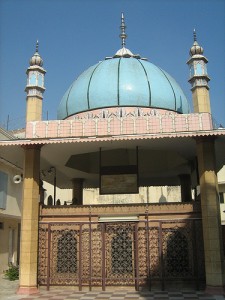| Quick Navigation |
Silsilah
-
1. Muhammed Rasuul Allah e
-
2. Hazrat Abu Bakr as-Siddiq t
-
3. Hazrat Salman al-Farsi t
-
4. Hazrat Qassim h
-
5. Hazrat Jaafar Saddiq h
-
6. Hazrat Abu ba-Yazid Bostami h
-
7. Hazrat Abul Hassan Kharqani h
-
8. Hazrat Abu Ali Farmadi h
-
9. Hazrat Yusuf Hamadani h
-
10. Hazrat Abdul Khaliq Ghujdawani h
-
11. Hazrat Arif Reogri h
-
12. Hazrat Mahmood Anjir Faghnawi h
-
13. Hazrat Azizan Ali Ramitani h
-
14. Hazrat Muhammed Baba Samasi h
-
15. Hazrat Syed Ameer Kulal h
-
16. Hazrat Syed Bahauddin Naqshband h
-
17. Hazrat Ala'uddin Attaar h
-
18. Hazrat Yaqub Charkhi h
-
19. Hazrat Ubaydullah Ahraar h
-
20. Hazrat Muhammed Zahid Wali h
-
21. Hazrat Darwaish Muhammed h
-
22. Hazrat Khwajgii Amkingi h
-
23. Hazrat Raz'uddin Baqi bi-l-Lah h
-
24. Hazrat Ahmed Sarhindi Faruqi h
-
25. Hazrat Muhammed Masum h
-
26. Hazrat Saifuddin h
-
27. Hzrt Syed Nur Muhammed Badawani h
-
28. Hazrat Mirza Jan-i Janaa Mazhar h
-
29. Hazrat Shah Ghulam Ali h
-
30. Hazrat Shah Abu Saeed h
-
31. Hazrat Shah Ahmed Saeed h
-
32. Hazrat Shah Muhammed Umar h
-
33. Hazrat Shah Abul Khair Dehlvi h
-
34. Hazrat Bilal Faruqi h
-
34. Hazrat Zaid Abul Hassan Faruqi h
-
34. Hazrat Salim al-Faruqi h
-
34. Hazrat Shah Abdul Aziz Kuhlnavi h
-
35. Hzrat Syed Mahmood Hassan Rizvi h
-
35. Hazrat Khwaja Masoom h
-
35. Hazrat Abdul Rahim h
-
36. Hazrat Nisar Ahmed h
28. Hazrat Mirza Jan-i Janaa Mazhar h
|
[ to be translated in English ] |
یا الہٰی مجھہ کو بھی جامِ شہادت کر نصیب |
| [ to be translated in English ] | مظہرِ جاں، جاں نثارمصطفٰے کے واسطے |
- Extracts from Sijra-ay-Tayyiba - Shiekh Syed Mahmood Hassan Rizvi (Rehmat'ullah Alaiyh)
حضرت سیدمیاں محمّد حسن محمود رضوی نقشبدی مجددی عزیزی رحمتاالله علیه
Translation to English by Anwar-un-Nabi [please forgive any mistakes]
- Details
- Written by Anwar-un-Nabi (انوارالنبی ابن نسار احمد)
Hadhrat Mirzā Mazhar Jān-e-Jānān Shahīd, may Allah sanctify his secret, was born on Friday 11th Ramadān 1111 AH. He was an Alawi by descent, from the descendants of Sayyidina Imam Ali, may Allah be pleased with him.
The great Mughal emperor Aurangzeb, who was also a follower of the Naqshbandi tariqah, suggested Jān-e-Jān as his name which later turned into Jān-e-Jānān.

The shrine of Mirza Mazhar Jān-e-Jānān in Khanqah Mazhariyah, Delhi, India
At the age of 18, he entered the servitude and spiritual studentship of Hadhrat Sayyid Nūr Muhammad Badāyūnī (1135 AH), a great Naqshbandi shaykh and a khalifah of Khwaja Saifuddīn Fārūqī Sirhindī (1096 AH). After four years, he received khilafah from his shaykh in the Naqshbandi Mujaddidi tariqah. When his shaykh passed away, he used to receive Fayd and spiritual training from the grave of his shaykh for about six years.
- Details
- Written by Anwar-un-Nabi (انوارالنبی ابن نسار احمد)
Shamsuddin Habib Allah
May Allah Sanctify His Soul"My eyes never beheld anyone more beautiful than you;
No woman gave birth to one more handsome,
Born faultless as if it was your wish."Hassan ibn Thabit
, speaking to the Prophet
.
He was the Sun of Eternal Happiness. He was the Beloved of Allah, Almighty and Exalted. He was the Spirit of the People of Truth, and he was the Essence of the Spirit of the People of Taste. He was the Kacba of the Godly and one of the Flags of the Noble Messenger. He elevated the Knowledge of the Religion of Muhammad ![]() . He revived the Way of the Naqshbandi Order.
. He revived the Way of the Naqshbandi Order.